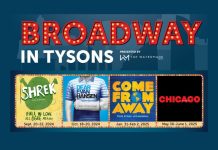Hootenanny is a word one hardly hears anymore. Whole generations have come along for whom it elicits blank stares and a big ”Huh?” The press release for Woody Sez: The Life & Music of Woody Guthrie (which has come back to Theater J all too briefly to reprise its sold-out, Helen Hayes Award–winning gig last year) explains quaintly but necessarily that hootenannies are “informal folk music jam sessions.” Mention “folk music” to fans of Justin Bieber or Miley Cyrus and they might think you mispronounced the F word. But for anyone who came of age before Madonna, the word hootenanny, when it pops up in patter during the four Woody Sez performers’ pre-show warmup, can prompt remembrances of things past more deliciously than Marcel Proust’s madeleine.

In Woody Sez, four extraordinarily gifted actor/singer/musicians—David M. Lutkin, Helen Jean Russell, David Finch, and Leenya Ridout—give a stirring concert featuring more than two dozen treasures from the Woody Guthrie songbook. All the while they weave in and out the life story of this superb folksinger-songwriter: he who, raised in the Dust Bowl, identified all his life with the down-and-out; he who identified their desperation as damage done by America’s owning class (he was on to the one percent long before Occupy Wall Street got their number); he who saw hope and a chance at change in collective organizing; and he who could set subversively inspiring lyrics to sweetly uplifting tunes.
Beyond being a rousing tribute to this maverick musician, Woody Sez offers pleasures to the ear, mind, and funny bone that leave one humming, thinking, and grinning. The cast performs not only unplugged—on guitar, bass, mandolin, fiddle, autoharp, banjo, and more—but also, so far as I could tell, unmic’ed. Within the Goldman Theater’s fine acoustics, this becomes an intimate and deeply satisfying aural experience. The cast’s voices are breathtakingly beautiful. Their polished staging and arrangements have evidently been refined down to the last gesture and semihemidemisemiquaver. And their performances could not be more joyous and fresh.
Guthrie wrote his classic “This Land Is Your Land,” we learn, because he found Kate Smith’s rendition of Irving Berlin’s “God Bless America” annoying (which in her over-warbled vibrato it was, sappy lyrics aside). The bit early in Woody Sez where Guthrie, in a live radio broadcast from Rockefeller Center’s Rainbow Room, insists on singing his rejoinder while the announcer tries to shut him up is as comic as it is prescient. Guthrie could not abide, and resisted all his life, what he called “sissified nervous rules of censorship.” As Woody Sez calls to mind, there’s a long list of singer-composers he influenced musically to whom he also passed on that foundational principle of a free society.

Guthrie’s politics were radical; he championed the poor and unprivileged; he discomfited the comfortable. He also knew his political homeland was not only America but the world. When, regarding war, he says he “saw the difference between wanting something to stop and wanting to stop it,” we catch a glimpse of the activist grit beneath the gorgeous sonority of his songs. Of course Woody Sez, like many a well-crafted traditional musical, has no intention of being a troublemaker like the troubadour it’s about. The show is comforting and reassuring, actually—like a fond old-time portrait softened around the edges so it’s a presentable and accessible vignette. I was aware during the show that I was not getting to know Woody Guthrie the real revolutionary up close and personal. But the show made me curious, made me want to know more, made me realize and appreciate what an important national hero he is. And you know what? That’s a wonderful thing: theater as tasty pastry, to open and expand one’s awareness and prompt one to remember more.
_____
After selected performances of Woody Sez, there will be informal, improvised hootenannies that are free and open to the public (regardless of which performance you attended). Dates and times are here. Some will even be led by the delightful cast of Woody Sez. You can join in and sing along and bring your own musical instrument if you like, which promises to be…a hoot.
Woody Sez: The Life & Music of Woody Guthrie plays through December 14, 2013, at Theater J in the DC Jewish Community Center in the Aaron & Cecile Goldman Theater – 1529 16th Street, in Washington DC. For tickets, call the box office at (202) 777-3210, or purchase them online.
LINKS
Woody Sez: The Life & Music of Woody Guthrie website.
Mike Spain’s review of the November 2012 production of Woody Sez: The Life & Music of Woody Guthrie at Theater J.





